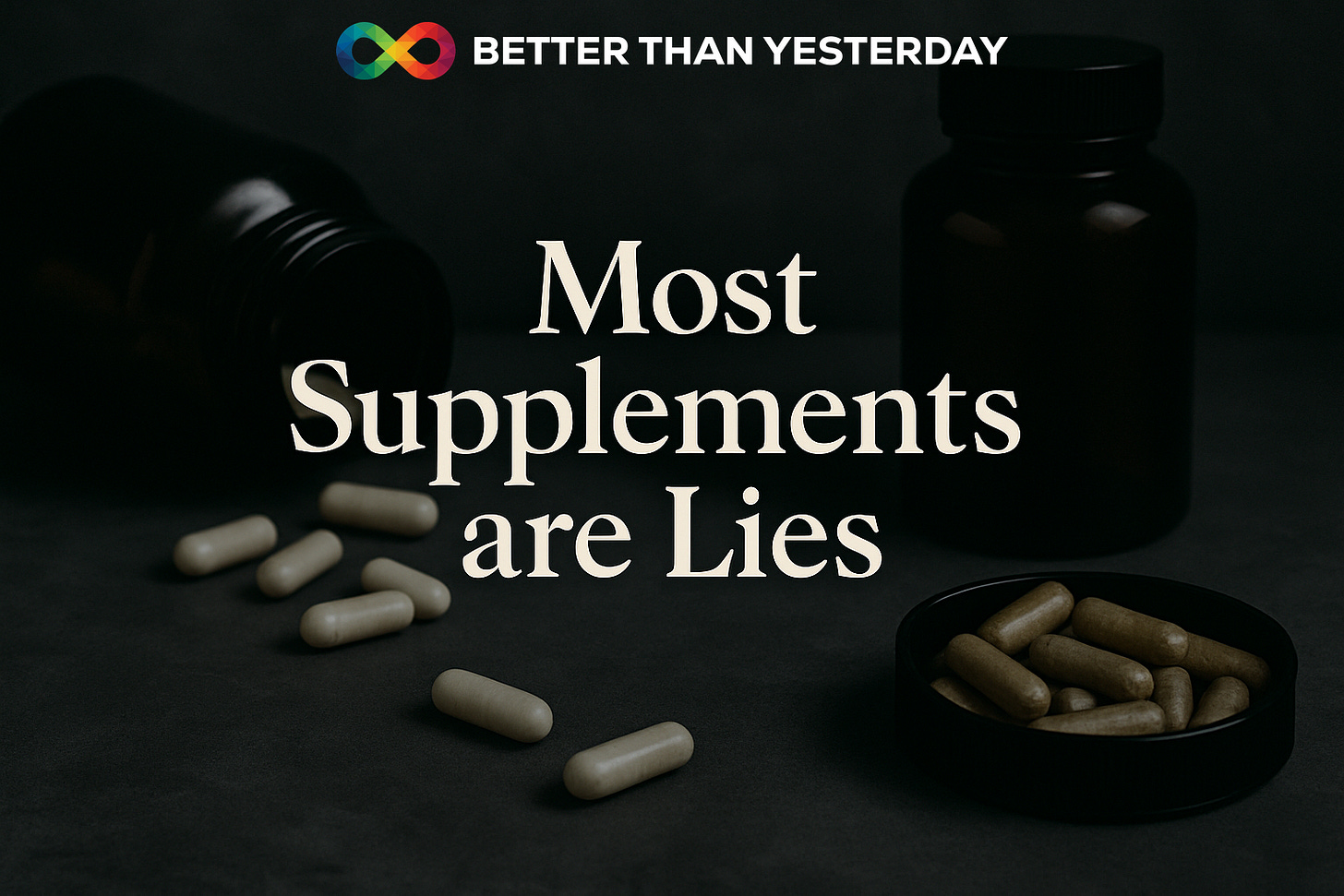Most supplements are scams
From fake herbs to hidden drugs, most supplements aren’t what the label claims.
Every year, Americans spend billions on supplements. And every year, more of those bottles turn out to be lies. Fillers instead of herbs, poisons instead of “natural,” even hidden drugs slipped inside capsules.
The last decade exposed the biggest supplement frauds, and it showed why protecting yourself matters if you still use them.
The NMN Disaster (2021)
In 2021, ChromaDex tested 22 of the top-selling NMN products on Amazon. The results were shocking: 64% contained less than 1% of the ingredient on the label. Some had none at all.
😳 Imagine paying $80 a month for what you thought was “longevity in a capsule,” only to find out you were swallowing rice powder.
This was one of the first wake-up calls that shook the longevity community.
NR’s Collapse (2025)
NR was supposed to be better. More stable, more reliable, more trustworthy.
But when ChromaDex tested NR products in 2025, only 13% matched their labels. The other 87% were underdosed or complete frauds.
⚡ If you invested in NR for mitochondrial support, odds are you were taking an expensive placebo.
When “Natural” Turned Toxic (2024)
VidaSlim branded itself as a natural weight-loss solution.
The FDA later discovered it contained yellow oleander: a poisonous plant that can stop your heart.
☠️ What people thought was a gentle herbal booster was actually deadly.
Hidden Drugs in Disguise (2024)
Amazon customers thought they were buying a supplement called Umary. What they got instead: a hidden mix of diclofenac (a prescription painkiller) and omeprazole (a stomach drug).
💊 Risks included internal bleeding, heart attack, and cancers that could go undetected.
This wasn’t wellness. It was a prescription cocktail disguised as “natural health.”
Exploiting the Pandemic (2020)
During peak COVID fear, Alive By Nature marketed NMN as a cure.
There was no evidence. The FDA eventually issued a warning, but only after customers had already spent money chasing false hope.
🦠 This wasn’t just misinformation. It was exploiting fear at its worst.
Even Big Retailers Lied (2015)
Walmart, GNC, Walgreens, and Target all got caught selling herbal supplements that didn’t contain the herbs on the label.
An investigation revealed that 79% were just fillers: beans, rice, and random plants.
🌱 Trusted brands, selling empty promises.
Why Does This Keep Happening?
Unlike pharmaceuticals, supplements don’t need to prove purity or dosage before hitting the market. Companies can sell first, get tested later.
The FDA usually only steps in after people are harmed.
😔 It’s not a system designed for consumer safety. It’s a system designed for loopholes.
What I Do Differently Now
Today, I only buy from companies that:
🧪 Publish third-party lab results for every batch
🎓 Work with universities or researchers
🔎 Disclose sourcing clearly, without “proprietary blends”
If a company won’t show test results, I won’t touch their products.
For the few supplements I still use, I’ve stuck with DoNotAge because they share independent lab tests for each batch. But I always read the studies myself: no supplement should replace critical thinking.
Lessons Learned
Supplements should boost energy, resilience, and longevity. But too often, they’ve given us fraud, toxins, and disappointment.
💡 The lesson from the past decade is clear: don’t trust the label, trust the proof.
Your health deserves more than empty capsules.
Sources
VidaSlim Recall — FDA Finds Toxic Yellow Oleander (Newsweek, 2024)
Umary Recall — Hidden Prescription Drugs (Miami Herald, 2024)
Anti-Aging Supplements Scam - SimplyAntiAging.com
Some links may be affiliate, which means I might earn a small commission at no extra cost to you.



